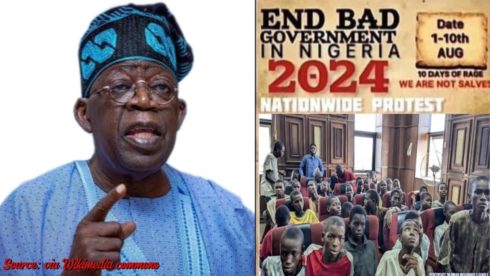President Bola Ahmed Tinubu has instructed the release of all minors apprehended and detained during the #EndBadGovernance protests. This directive, announced recently, reflects the government’s evolving stance toward addressing the aftermath of protests and ensuring the protection of minors under the law. President Bola Ahmed Tinubu’s administration has highlighted the importance of safeguarding youth rights and minimizing the effects of prolonged legal processes on young individuals.
This decision is expected to directly impact the lives of hundreds of Nigerian youths who were previously detained for their participation in the widespread protests. Many of these minors have remained in detention facilities since the protests, some without formal charges, sparking criticism from human rights organizations that decry the treatment of young protesters. The directive is anticipated to prompt swift action within the judicial system to fulfill the president’s order.
EndBadGovernance Protests: A Catalyst for Change
The #EndBadGovernance protests emerged as a movement aimed at calling attention to pressing issues, including police brutality, government transparency, and socioeconomic inequalities. The protests, which took place in several Nigerian cities, united a wide demographic of Nigerians demanding systematic reform. While peaceful in intention, the protests faced violent crackdowns, resulting in numerous arrests, including minors who were actively or passively participating in the demonstrations.
The detention of minors became a focal point in discussions on the protest’s handling, as activists argued that such arrests violated the rights of children and adolescents under Nigerian and international law. President Bola Ahmed Tinubu’s recent decision to release these minors represents a critical acknowledgment of the lasting social impact of these demonstrations, highlighting the government’s responsiveness to concerns around juvenile justice.
Judicial and Human Rights Perspectives on the Release
Legal experts and human rights advocates have commended President Bola Ahmed Tinubu’s directive, viewing it as a step toward aligning Nigeria’s justice system with global standards for juvenile rights. The decision to release detained minors resonates with provisions within Nigerian law that emphasize the protection and rehabilitation of young people rather than punitive measures. Human rights organizations have urged the government to implement additional measures to ensure fair treatment of minors in the judicial system and to avoid future incidents of arbitrary detention.
Advocates for child welfare have pointed out that prolonged detention can lead to psychological trauma, adversely affecting minors’ development and prospects. With the president’s order, attention is now shifting toward the need for judicial reforms, specifically measures that prioritize rehabilitation and alternative sentencing for minors involved in civil actions. This directive could open doors to a more equitable approach to juvenile justice in Nigeria.
Public Reactions: Mixed Responses from Nigerians
The directive has stirred a range of responses from Nigerian citizens. Many have expressed relief, especially families of the detained minors, who have waited months, even years, for their loved ones to regain freedom. Parents and guardians have voiced gratitude for the president’s empathy, underscoring the importance of governmental responsibility in safeguarding young Nigerians’ rights. Social media is abuzz with conversations, as Nigerians debate the implications of the president’s decision for future governance and civic activism.
However, some Nigerians remain skeptical, questioning whether the government’s action is a genuine step toward reform or a political move aimed at appeasing dissent. Critics are calling for more concrete policies to ensure accountability in the government’s response to public protests. This directive has brought issues of transparency and government credibility to the forefront of public discourse, as citizens demand structural changes beyond one-time directives.
President Bola Ahmed Tinubu: Impact on Future Youth Involvement in Civic Movements
President Bola Ahmed Tinubu’s decision may have a lasting impact on youth participation in civic matters, as young Nigerians reconsider their engagement in national dialogues. The #EndBadGovernance protests underscored the willingness of the Nigerian youth to stand up against perceived injustices and demand a fairer society. The release of detained minors could signify a shift in how young people approach activism, potentially encouraging more inclusive and constructive channels for expressing civic concerns.
Analysts note that this directive could either embolden or temper youth activism, depending on the government’s future handling of similar incidents. For many, the treatment of youth protesters reflects Nigeria’s commitment to democratic values, and this directive could inspire a generation to pursue change within a framework of respect and lawful engagement.
President Bola Ahmed Tinubu: Potential Reforms in Juvenile Justice System
With President Bola Ahmed Tinubu’s order setting a precedent, there is growing anticipation of further reforms within Nigeria’s juvenile justice system. Human rights advocates are urging the government to introduce policies that protect minors in the judicial process, promote alternative sentencing, and provide rehabilitation opportunities. Experts believe that sustained reforms could transform the justice system’s approach to juvenile offenders and minimize the risk of future detentions arising from peaceful protests.
The government’s handling of the current directive will likely determine public perception of its commitment to human rights and the rule of law. Stakeholders are calling for transparent implementation of the president’s order, emphasizing that the welfare of minors within the legal system should be a priority in any democratic society.
Table of Contents
Discover more from OGM News NG
Subscribe to get the latest posts sent to your email.














